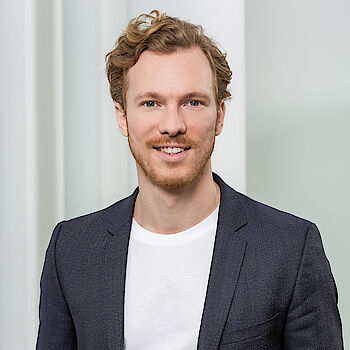In March, Maik Hesse successfully defended his doctoral thesis on the topic of trust, reputation and data sovereignty in the digital platform economy. From January 2019 to March 2021, he completed his doctorate under ECDF Professor Timm Teubner (TU Berlin), who heads the research group "Trust in Digital Services". Hesse is thus the first doctoral student to complete his PhD at ECDF. In this interview with Samira Franzel, he talks about his time as a doctoral student at the ECDF.
You started your doctorate at the end of 2018 and successfully defended it in March 2021. How do you look back on that time?
It is great to be able to learn and do research at such a leading institution as the ECDF. At the ECDF, I particularly appreciate the exchange with colleagues on site: A wide variety of disciplines come together here, but we are all united by our focus on digitization. Especially before the Corona pandemic, I spent a lot of time in the Robert Koch Forum and exchanged ideas with colleagues, and in the last few months, of course, mostly digitally. The content-related supervision by Prof. Timm Teubner has helped me a lot, so many joint projects with him have also emerged outside my dissertation.
When and why did you decide to do your doctorate?
I first studied mathematics in Cologne and the USA, with a minor in business administration. I then worked in consulting in the area of digital transformation. The main focus was on how technologies can be used to design new business models, what requirements and skills are needed in companies for this, and what influence digital technologies have on the business world. I always had it in the back of my mind that I might still want to do a PhD. Then, in September 2018, I read a little deeper into the topic of digital platforms. I was particularly interested in the fact that it is interdisciplinary - classic cross-sectional research in the field of digitalization that combines approaches from various disciplines of business informatics, economics, business administration, and sociology. The specific topic and the design of the doctoral thesis then came about with Timm Teubner.
What was the topic of your doctoral thesis?
I wrote my doctoral thesis in the area of digital platform ecosystems. It's mainly about how digital identity and sovereignty can be created and used on the Internet. The dissertation is titled "Trust and Reputation Portability in Digital Platform Ecosystems." On platforms such as Airbnb, eBay, Helpling, Uber or (food) delivery services, virtually anyone can now offer services and collect reviews, thus establishing a digital identity. Some of these platforms were even recently classified as systemically relevant - in the wake of the Corona crisis. However, the rating system creates a dependency for the providers on the platform, since the ratings are not transferable. One of the aims of my doctoral thesis was to explore how we can transfer this collected reputation to other services in the online and offline world, so that providers don't have to start over again and again. In the analog world, we are currently entitled to a job reference when we change jobs, and we should do the same in the digital world.
What else do you think we can expect in the future in the area of digitization?
One big topic that will be with us for a while is data and how we deal with it: How is data stored? How are they processed and what added value do they bring? I see a great need to train citizens in how to handle their own data so that they can become "masters of their data" and act in a self-determined manner. But this also includes the creation of independent digital infrastructures for the European economy, politics and society. The whole thing comes under the umbrella of "digital sovereignty. It also remains exciting to see what influence technologies such as artificial intelligence or blockchain will have on our working world. One thing is certain: completely new professions will emerge and others will become obsolete. As a society, we have to find the right way to deal with this in the medium and long term.
What advice would you give to future doctoral students who are also considering doing a doctorate at the ECDF?
The ECDF is simply an exciting research incubator - for me it was the right decision and a time with a lot of exchange and a great community right in the heart of the digital research metropolis Berlin. For a doctorate, however, you should realize that stamina and optimism are required. And: Doing a doctorate in 2.5 years is like a marathon with many intermediate sprints - so it's best to plan for some time.

